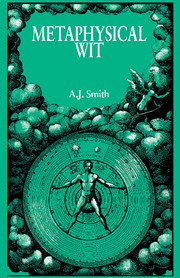
-
Select format
-
- Publisher:
- Cambridge University Press
- Publication date:
- 17 September 2009
- 09 January 1992
- ISBN:
- 9780511553394
- 9780521340274
- 9780521035293
- Dimensions:
- (216 x 138 mm)
- Weight & Pages:
- 0.47kg, 284 Pages
- Dimensions:
- (216 x 138 mm)
- Weight & Pages:
- 0.371kg, 284 Pages
You may already have access via personal or institutional login
Book description
English metaphysical poetry, from Donne to Marvell, is notoriously witty. In this 1992 book, A. J. Smith seeks the reason for the central importance of wit in the thinking of the metaphysical poets and argues that metaphysical wit is essentially different from other modes of wit current in Renaissance Europe. Formal theories and rhetorics of wit are considered both for their theoretical import and their appraisals of wit in practice. Prevailing fashions of witty invention are scrutinized in Italian, French and Spanish writings, so as to bring out the nature and effect of various forms of wit: conceited, hieroglyphic, transformational and others from which the metaphysical mode is distinguished. He locates the basis of Renaissance wit in the received conception of the created order and a theory of literary innovation inherent in Humanist belief, which led to novel couplings of time and eternity, body and soul, man and God.
Contents
Metrics
Altmetric attention score
Full text views
Full text views help Loading metrics...
Loading metrics...
* Views captured on Cambridge Core between #date#. This data will be updated every 24 hours.
Usage data cannot currently be displayed.
Accessibility standard: Unknown
Why this information is here
This section outlines the accessibility features of this content - including support for screen readers, full keyboard navigation and high-contrast display options. This may not be relevant for you.
Accessibility Information
Accessibility compliance for the PDF of this book is currently unknown and may be updated in the future.


